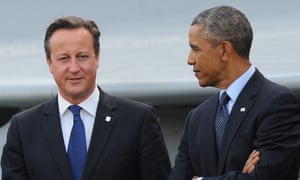Not My Fault, Chum
"When I go back and ask myself what went wrong there's room for criticism because I had more faith in the Europeans, given Libya's proximity, being invested in the followup."
"The way I looked at it was that it would be our problem if, in fact, complete chaos and civil war broke out in Libya. But this is not so at the core of US interests that it makes sense for us to unilaterally strike against the Gaddafi regime."
U.S. President Barack Obama
"Prime Minister Cameron has been as close a partner as the president has had and we deeply value the U.K.'s contributions on our shared national security and foreign policy objectives which reflect our special and essential relationship."
Edward Price, White House spokesman
 |
| David Cameron and Barack Obama. Photograph: Stefan Rousseau/PA |
But there it is, they made a choice. They made a choice in Libya that they had no intention of repeating in Syria. And so the 'no fly zone' became their contribution. While it's true that Gaddafi unleashed his military to strike at the rebel militias and he was impeded mightily by NATO members' overflights protecting the militias from the air and bombing the regime's armoured vehicles to the militias' advantage, once Gaddafi was neutered (horribly, in line with Middle East tradition), the NATO allies decamped claiming victory.
The United States initially led the strikes against Gaddafi, launching hundreds of Tomahawk cruise missiles offshore from American ships along with the British, while the no fly zone component was pursued by other members of NATO, including France, Britain, Canada, Belgium, Italy, Norway, and one Middle East nation, Qatar. Once the rebel militias had prevailed, however, the foreign elements decamped and left Libya to its own devices.
Its own devices were led by a fractured nation which showed no signs of coalescing into a cooperative effort to rescue the country from its own proclivity to continue another kind of conflict; tribal and clan and sectarian warfare. A two-pronged government ensued, splitting the country into two major political factions, and the militias continued to harass the population, refusing to surrender their arms to a national force.
Five years later, nothing of benefit to the country has been resolved, and matters have been complicated by Islamic State moving into Libya, and an unregulated, irregular transit of black market oil has taken the place of the Libyan fisheries. Now, President Obama refuses, just like any other country that was involved in the conflict, to take responsibility for the outcome of a shattered country. The trouble with that tack is that the United States always leads, and always is expected to lead.
It did in this instance, then attempted to recede into the background, giving European countries the lead. But as the world's only superpower and conventionally its guide and leader, stepping down from that role and then disclaiming responsibility for unfortunate outcomes doesn't resound very convincingly. The matter of leadership failure falls more convincingly on Obama's shoulders than it does on Cameron's.
The chaos that represents Libya to this day is as much of America's making as it is of Europe's. The unleashing of a state of insecurity in Libya had its fallout in neighbouring African countries like Mali which had depended on the support of Libya's benefactor to North Africa, Col. Gaddafi. The fact that Libyan arms depots were left unsecured, along with its chemical agents, had much broader repercussions in the geography when it became a free-for-all grab for terrorist groups.
This is yet another incident where the United States has interests of its own in various parts of the world, has become involved in conflicts there, and then steps away from the responsibility of the consequences of its actions. On the other hand, the ungoverned and ungovernable mess that is Libya today makes one wonder what might have happened had the United States stepped authoritatively into the Syrian fray, supporting Syrian rebels.
Europe, for one thing, would not now be submerged in an unstoppable tide of Syrian refugees fleeing the carnage that its president has visited upon them. There would have been no chemical attacks, no barrel bombings, no starvation sieges, and no Russian intervention spurring on an increase in refugee movement into Europe to produce a humanitarian crisis of volcanic proportions. But then, what-ifs have never accomplished anything worth a damn.
Labels: Chaos, Conflict, Libya, NATO, United States
0 Comments:
Post a Comment
<< Home